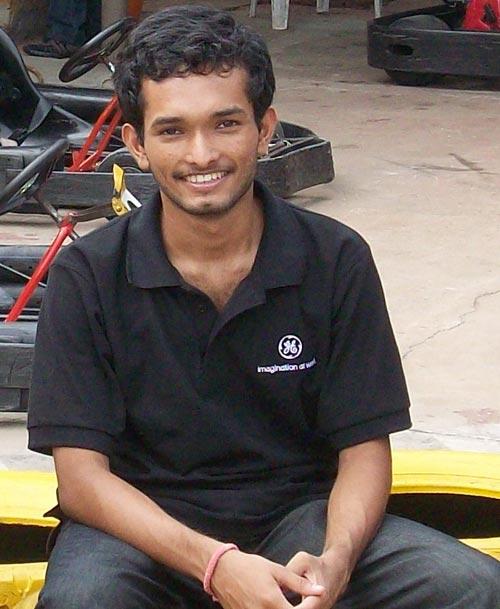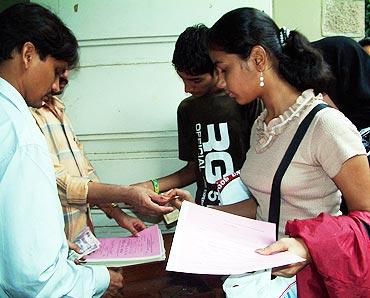
This 21-year-old mechanical engineering student from Pune credits his success to a modest upbringing and family support.
Sumit Patil, an engineering student from the Indian Institue of Technology-Madras is one of ten toppers who aced the Common Admission Test this year.
He scored an impressive 222 out of 225 in what is considered the country's toughest management entrance test.
Among the top scorers in the 100 percentile category, many of whom were repeating their attempts, Sumit is one of the few who achieved the near-perfect score in his very first attempt. And to manage that with little coaching is no mean feat.
So how did he do it? What was his strategy?
Theoretically, Sumit did not spend more than six to 12 hours a week studying, but then we know that it takes more intelligence than rote learning to crack an aptitude test like the CAT.
The aspiring management graduate tells us that his determination to excel stemmed from the disappointment he suffered in 2006, when despite scoring 91 per cent in his board exams, he failed to make it to the merit list.
"In 2006, I'd lost the merit ranking by a few marks. That's when I decided that I won't let it happen again."
The young achiever, who aspires to make it to one of the three leading IIMs (Ahmedabad, Bangalore and Calcutta in his opinion), credits much of his success to his modest upbringing.
"My parents never forced me to study or score 'x' number of marks. They never influenced my career decisions or told me what I should do. It was the same for my elder sister," he says, before thanking his parents for the faith and freedom he enjoyed in his growing up years.
Sumit's father Prakash Patil works as a supervisor at Tata Motors in Pune, while his mother Savita is a homemaker. His elder sister Shraddha, who works at Tata Consultancy Services, was his early mentor.
"When I was young, much of what I learnt was through my sister. She would tell me about the mistakes she made in her career and I would ensure that I didn't repeat them," says Sumit, who is in his final year and also the student head of the mechanical engineering department at IIT-Madras.
In this interview, he tells us why he chose to do a BTech and MTech integrated course in mechanical engineering at the institute, why he'll make a good leader and his future plans for the country. Read on...
Please click NEXT to continue reading...

How did you manage to crack CAT in the first attempt? What was your strategy?
I always wanted the perfect score, but while preparing for the test, my sole aim was to focus on solving all the questions in the given time. Since the beginning, I never had much difficulty in solving questions per se. During mocks too, I would usually lose out on the time factor. A few weeks before the exam, I worked on improving my speed and accuracy.
Did you take any coaching?
I did not take any coaching, but I did enrol for a test series so that I could practice more mocks.
How did you prepare for the exam? How many hours did you study?
I started preparing from July 2012, but I don't remember dedicating 'x' amount of time towards CAT. I would study about one or two hours a day and a maximum of five to six hours a week. I also feel that, for a bright student, it is the quality of time that matters more.
What study material did you refer to?
I referred to the standard textbooks to prepare for Quant and I feel that was more than enough. For the verbal section, I read newspapers and non-fiction books to improve my vocabulary and knowledge of words.
According to you, which was the most difficult section in the exam?
Being an engineer, the Quantitative Ability was not a difficult section to crack. The task, however, was to apply the formulae and solve each question in the given time frame, which required more practice and better speed.
In which areas do students generally tend to go wrong about the test?
Students who do not have an engineering background find the quant section to be the most challenging. This is because their foundation in mathematics is not very strong. They struggle with calculations and lose precious time there.
Some others who are strong in mathematics find the Verbal Ability section tougher, because in the English language there are several words that sound similar, but do not necessarily have the same meaning. Students who cram new words without understanding their meaning or context find it tough to crack.
In terms of difficulty, how is the CAT different from JEE?
Among the two, JEE is a much advanced test. JEE tests your advanced aptitude skills in physics, chemistry and mathematics. It is also more time consuming.
CAT on the other hand only expects you to know basic mathematical concepts and formulae. Those who are weak in mathematics have the advantage of scoring better in the verbal section.

Tell us a bit about your life at the IIT-Madras. Also, why did you choose Madras over Bombay after completing Class 12?
When my sister and I were kids, my father who works as a supervisor at Tata Motors would always come home from work and brag about his company -- the quality of work, processes and people working there. During my growing up years, I'd realised that I wanted to study mechanical engineering so that some day I could work for the Tata group in one of their plants.
After JEE, the dual engineering course at IIT-Madras interested me and I came here. The four years I have spent at this institute also have been the most memorable of my life.
They have exposed me to a wide range of people across domains; interactions with most of them have helped me gain so much knowledge outside the curriculum.
At IIT-M, you learn to think beyond the obvious, often surprising each other with new ways to look at a problem and then come up with a solution. It's an experience I would recommend every student must have at some point in their careers.
What were your feelings when you did not make it to the merit list in the Class 10 boards?
In my Class 10 exam, I scored 91 per cent but missed the merit list by a few marks, so I was very disappointed. I thought that all my preparations and hard work in the last one year had been futile, because I could not achieve the merit ranking.
How did you overcome that phase? Please share some tips with our young readers on how to overcome failure.
Fortunately for me, my parents were not pushy. So, in a few weeks, I had realised that I was punishing myself a little too much.
All of us face failure in life and so did I, on various occasions throughout my life and career. Today, I may be too young to give any advice, but from my experience of failure, I have learnt that the sooner you get out of it, the more time you will have to bounce back.
Whenever I fail at something, I tell myself that it could have been worse, but it wasn't. No matter how bad it may seem at that time, we must learn not to be discouraged by the results of our actions.

The IIMs have decided to hike their fees for the incoming batch. How does it affect you?
Frankly, I never considered the fees of any of these institutes as an obstacle to my career. On a positive note, I feel that students who are worried must also take into account that these are the best management institutes of the country.
If you were to compare the fees with some of the private b-schools, you'd realise that the same facilities come at a subsidised rate in government-backed schools like the IITs and IIMs. Students studying at any of these institutes will agree that they provide the best in education and give the best value for money.
How are you preparing for the upcoming GD/PI rounds?
No overwhelming preparations as such, because I had started preparing for interviews ahead of the campus placement in December last year. I read the newspapers and stay up- to-date on the recent happenings just like always.
I am particularly working to improve my presentation skills -- how to express my ideas and opinions better -- because I feel the b-school panel will be testing our communication and presentation skills for selection.
What are your future plans?
I want to pursue an MBA from one the IIMs -- A, B or C. However, my ultimate aim is to may be join a conglomerate like the Tata group and work with the best brains in the industry.
I want to be part of a project which deals with improving the processing technologies -- one that will help me work towards delivering a better product to the consumer.
I want to be a leader and help the people in my team think and express their ideas freely.
Your advice to CAT aspirants?
CAT is not a very difficult test to crack, provided your concepts are clear. To improve your vocabulary, read as much as you can.
Focus on maximising your efforts and solve more question papers so that you have an idea of what questions to expect. Besides learning new concepts, also work on your weak areas and learn from your mistakes.
How do you unwind?
I read non-fiction, and mostly autobiographies. I have enjoyed read Steve Jobs' autobiography by Walter Isaacson and Lance Amstrong's It's Not About The Bike.
I also enjoy playing chess and table tennis.
Please recommend some books for our young readers.
I have read many good ones, but The Last Lecture by Randy Pausch is one of the most inspiring books I have read to date. In the book, the protagonist, a professor of science, is diagnosed with cancer and has six months to live. He delivers a lecture on how to achieve one's childhood dreams -- it sends an inspiring message to anyone who reads it. I strongly recommend the book.
Your message to youngsters and parents?
To young readers, I'd say, don't be disheartened if you fail at something. Think of it as an opportunity to work towards creating or achieving something better. Be happy with what you have and excel in that.
I'd like all parents to give their children the freedom to decide what they want, just like my parents did.
As elders, they must also have faith in their children that they will not choose something wrong and even if they did, they'll have the courage to accept failure and move ahead in their lives.